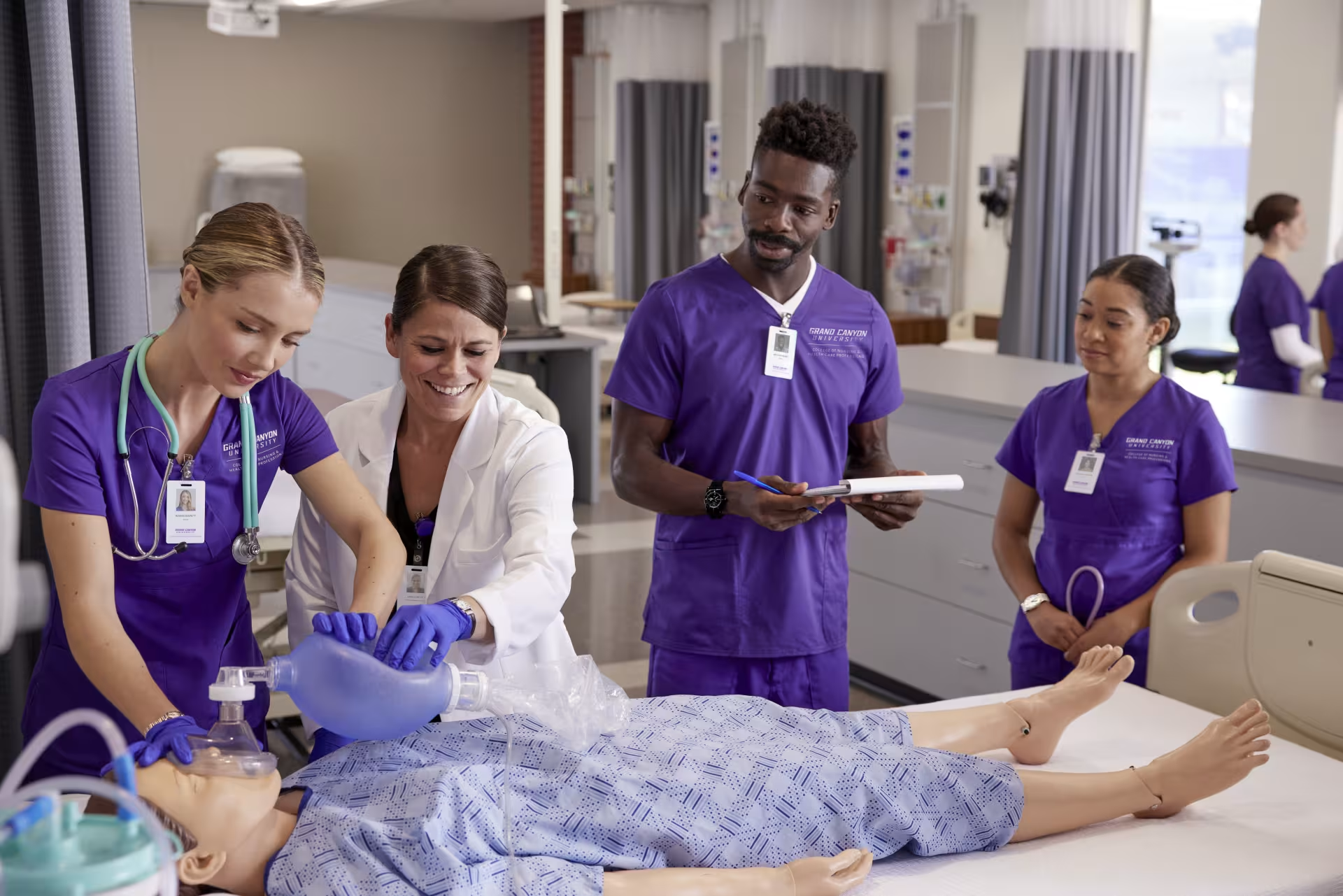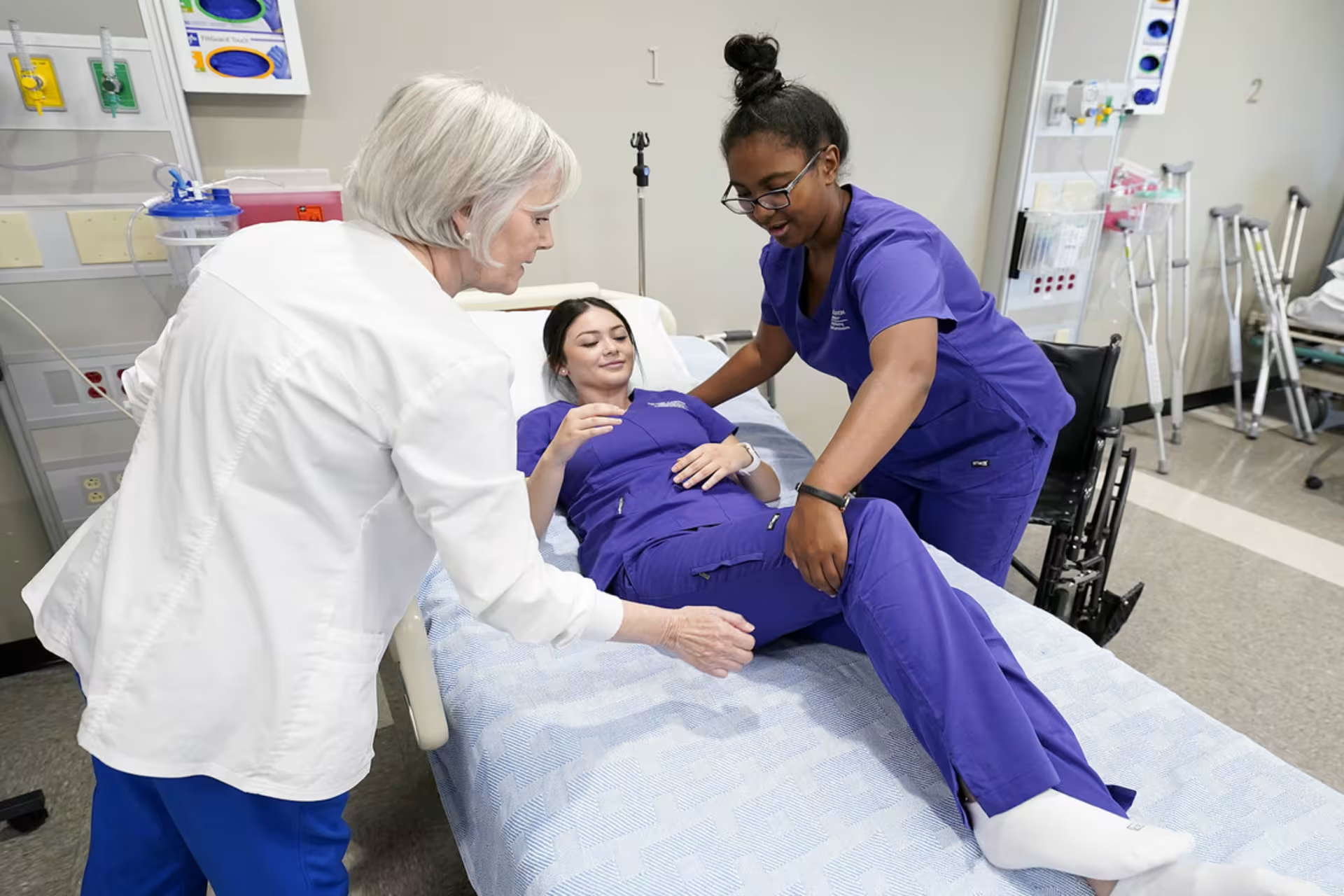
BSN Degree (Pre-Licensure)
Build Your Future in Nursing With a BSN Program
The Bachelor of Science in Nursing (BSN) Pre-Licensure degree from GCU is designed to prepare you to practice as a generalist registered nurse (RN). This nursing degree teaches core nursing knowledge and skills applicable across all nursing specialties and in a variety of health-related settings. The focus of our pre-licensure BSN is to prepare future nurses to deliver quality care and contribute to better patient outcomes through evidence-based, holistic practices for diverse communities and populations.

Campus: $8,250 per semester [More Info]
Up to 90 credits, only 84 can be lower division
Credits: Fill out the Lopes Eval to find out what will transfer
Admission Requirements (Bachelor's)
- 16+ years old
- High School Graduate
- 3.0+ Unweighted GPA
OR 2.5+ Unweighted GPA and
- ACT: 19
- SAT: 1000*
Admission requirements may differ based on degree level, program and modality, or transfer status. Some programs of study may require a higher GPA and/or other qualifying criteria for admission. Please review full admission and program requirements in the University Policy Handbook.
*Math and reading only on a 1600 point scale (test date after 3/1/2016). SAT score of 1380 required for 2400 point scale (test date before 3/1/2016).
Benefits of a Practice-Focused Nursing Education
The pre-licensure nursing program includes clinical practice with hands-on experience. You will be expected to work across the continuum of care to experience actual patient care scenarios you may face during your career. You will be taught how to promote health for your patients and how to use new technology to support high standards of patient care. There is a focus on the development of leadership skills, critical thinking and professional ethics in nursing.
During the clinical program, you work directly with patients under close supervision of your nursing instructors. You will also complete a capstone project that requires research and evidence-based findings, which is intended to help you implement safety practices that contribute to better patient outcomes.
If you already have a bachelor’s degree, consider enrolling in our accelerated BSN (ABSN) program for a faster route to earning your nursing degree.
"My experience at the College of Nursing at GCU has prepared me super well for transitioning into real-life nursing. Not only based off the skills I'm learning, but the ways I'm learning to interact with other people."
"My experience at the College of Nursing at GCU has prepared me super well for transitioning into real-life nursing. Not only based off the skills I'm learning, but the ways I'm learning to interact with other people."
Experience Nursing Simulations as a BSN Major
BSN majors will work through immersive patient care simulations conducted in fully equipped immersive simulation suites with a control room, nurses’ station, four hospital rooms and debrief rooms. You will have access to our simulation suites during the third and fourth years in the program. Immersive simulation consists of clearly constructed, well-considered clinical scenarios intended to nurture and challenge student development.
You will practice interacting with patients in scenarios that are aligned with national standards and best practices. Nursing simulations provide opportunities to develop critical thinking and clinical reasoning in a safe environment. Skills and clinical judgment taught in nursing simulations are immediately transferable to healthcare settings.


Sim Center Mission for Nursing Students
The Lopes Center for Nursing Simulation provides opportunities to develop competent, compassionate, ethical professionals and innovative thinkers using evidence-based practice to connect theory to the real world. The immersive simulation experience can enable students to develop and apply critical thinking and clinical reasoning skills in a safe, consistent learning environment. Students can become effective communicators and transformative, servant leaders who utilize holistic Christian values to help promote human flourishing.
Course Topics in GCU’s Pre-Licensure BSN
The broad survey of various patient populations in this pre-licensure BSN is designed to empower future nurses to pursue any nursing specialty. In addition to these topics, you will have the opportunity to learn how to care for people across their lifespan.
The coursework required by this BSN degree dives into the core topics and competencies tested by the NCLEX-RN. It includes topics such as:
Head-to-toe health assessment
Adult health
Behavioral health
Pediatrics
Obstetrics
Pharmacology
Informatics
Evidence-based practice
Nursing ethics
Healthcare policy
GCU’s NCLEX first-time pass rate for Phoenix, Arizona in 2024 was 97.17% (275)(See disclaimer 2)
Start Your Path to RN Licensure With NCLEX-RN Prep
It is a licensing requirement for future RNs to pass the National Council Licensure Examination for Registered Nurses (NCLEX-RN(See disclaimer ®)) in order to work as nurses.(See disclaimer 1) The exam requires critical thinking and an understanding of ethical nursing practices. GCU is dedicated to preparing nursing students for the NCLEX-RN as demonstrated by our first-time NCLEX pass rates.
TTP Nurse Residency Experience
You may have the opportunity to apply for the Transition to Practice (TTP) Nurse Residency experience prior to your last semester. This career-focused experience will pair you in one-to-one preceptorship at host healthcare locations. The TTP experience is designed to enrich the academic experience and career readiness of newly licensed RNs.
Career Paths With a Pre-Licensure BSN Degree
Pre-licensure BSN nursing program graduates are eligible to take the NCLEX-RN exam. After successfully completing the exam, you can become an RN. With a focus on quality of care and patient safety, BSN graduates may be prepared to pursue nursing positions across a variety of healthcare settings, such as:(See disclaimer 3)
After gaining some clinical experience, RNs with a BSN may decide to pursue graduate-level nursing education. A Master of Science in Nursing (MSN) and/or a Doctor of Nursing Practice (DNP) degree both provide opportunities for RNs to sharpen their clinical skills, deepen their nursing knowledge and position themselves to potentially pursue advanced roles or leadership positions.
Earn an Accredited BS in Nursing Degree
GCU is an institutionally accredited university, having been proudly accredited by the Higher Learning Commission since 1968. The College of Nursing and Health Care Professions shares the university’s commitment to upholding the principles and standards established by our accrediting bodies.
Grand Canyon University’s immersive simulation centers for pre-licensure and accelerated tracks of the Bachelor of Science in Nursing program have been granted accreditation in the area of teaching/education by the Society for Simulation in Healthcare (SSH).
The baccalaureate degree programs in nursing, the master’s degree programs in nursing, the Doctor of Nursing Practice programs and the post-graduate APRN certificate programs at Grand Canyon University are accredited by the Commission on Collegiate Nursing Education (https://www.aacnnursing.org/ccne-accreditation). For more information on the accreditation of nursing programs and other university approvals, please visit our University Accreditation and Regulations page.

Frequently Asked Questions
Learn more about pre-licensure nursing and earning your BSN by reviewing our frequently asked questions.
Do I need to be an RN to get a BSN?
What can you do with a BSN (pre-licensure)?
How does a BSN degree prepare you for passing the NCLEX-RN?
Program Curriculum
General Education Requirements
Required General Education Courses
Core Courses

Pursue a career devoted to making a positive difference for others.
- All nursing students are responsible for understanding the state nursing licensure requirements for the state in which they plan to practice.
- Arizona Board of Nursing. Arizona NCLEX Pass Rates. Retrieved Feb. 21, 2025.
- U.S. Bureau of Labor Statistics. (2024, Aug. 29). Registered Nurses: Work Environment. Occupational Outlook Handbook. Retrieved Nov. 19, 2024.
- Giorgi, A. (n.d.). NCLEX Exam Guide (Registration, Eligibility, FAQ and Study Tips). All Nursing Schools. Retrieved Nov. 19, 2024.



